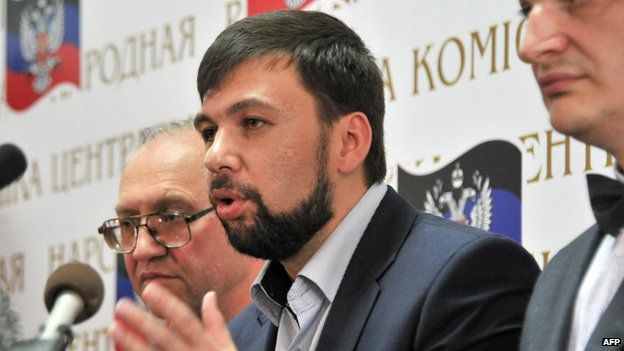East Ukraine separatists seek union with Russia
- Published

A Ukrainian separatist leader is calling on Russia to "absorb" the eastern region of Donetsk after Sunday's referendum on self-rule.
Self-declared Donetsk People's Republic leader Denis Pushilin urged Moscow to listen to the "will of the people".
In neighbouring Luhansk, where a vote was also held, rebels declared independence.
Ukraine, the EU and US have declared the referendums illegal but Russia says the results should be "implemented".
Moscow has so far not commented on the call for Donetsk to become part of Russia but has appealed for dialogue between the militants and Kiev, with the participation of the Organisation for Security and Co-operation in Europe.
Russia annexed Ukraine's southern autonomous republic of Crimea after a disputed referendum in March and Kiev now fears its intentions in Donetsk, Luhansk and parts of southern Ukraine.
Nato believes some 40,000 Russian troops are deployed near Ukraine's border, although Moscow says they have been pulled back.
'Appropriate step'
Separatists in Donetsk and Luhansk say 89% and 96% respectively voted in favour of "self-rule" in the referendums, held a fortnight before Ukraine's presidential elections.
Ukraine's acting President Olexander Turchynov said the turnout for the referendum was much lower than the figure of 75% claimed by the rebels.
"According to the Interior Ministry... about 24% of people eligible to vote took part in the so-called referendum the Luhansk Region and slightly over 32% in the Donetsk Region," he said.
But Mr Pushilin said the 25 May vote would not happen in Donetsk because it was now "independent".
He added that he was not calling for Russian military intervention but that peacekeepers may be needed.
Olexander Turchynov said the referendums were "nothing more than propaganda"
The region would switch to the Russian currency, the rouble, he said.
Earlier the head of the rebel Donetsk election commission, Roman Lyagin, said joining Russia "would probably be an appropriate step".
Vasily Nikitin, a spokesman for rebels in the Luhansk region, said the Ukrainian presidential election would not be allowed to take place there after "independence".
"The people of Luhansk Region declare the creation of a sovereign state - the Luhansk people's republic" said a statement released by rebels.
Travel bans
Mr Lyagin is one of 13 individuals on a new EU sanctions list for "undermining or threatening" Ukraine's sovereignty.
Those singled out include Russian President Vladimir Putin's first deputy chief of staff, Vyacheslav Volodin, the self-declared mayor of Sloviansk, Vyacheslav Ponomaryov, as well as two Crimean companies.
Meanwhile, German Foreign Minister Frank-Walter Steinmeier is to visit Kiev on Tuesday in an attempt to mediate between the sides and might travel on to eastern Ukraine.
The Kremlin criticised Brussels' new sanctions, saying the EU had "undermined trust in itself as a partner and cast doubt on its claim to an objective role in supporting a resolution of Ukraine's internal conflict"
It also denounced what it claimed had been "attempts to disrupt the votes, with the use of force, including the use of heavy weapons, against civilians".
The Russian authorities said they expected the results of the vote to be implemented in a civilised manner, without any repetition of violence and called for dialogue between Kiev, Donetsk and Luhansk.
Earlier, Ukraine's acting president told Ukraine's parliament that "the farce that terrorist separatists call a referendum is nothing more than propaganda to cover up murders, kidnappings, violence and other serious crimes".
Rinat Akhmetov, one of Ukraine's wealthiest businessmen, said he was convinced that the Donetsk and Luhansk regions would "only be happy in a united Ukraine".
A number of towns in the two eastern regions refused to hold the referendums.
Are you in Donetsk or Luhansk region, or elsewhere in Ukraine? What do you think of the "self-rule" referendums? Send us your thoughts by emailing haveyoursay@bbc.co.uk using the subject line "Ukraine".